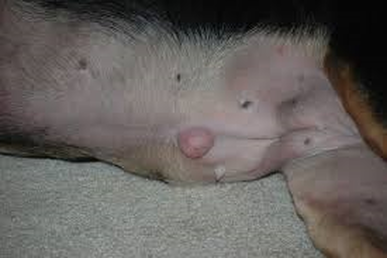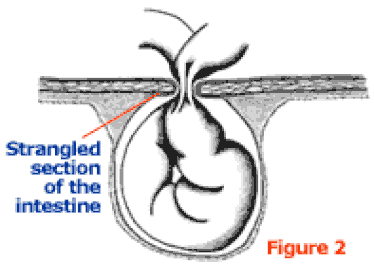Umbilical Hernias
Do Pets Have Belly Buttons?
Answer: They should have a faint scar but they should not have a "button".
Before birth, the developing puppies or kittens have an umbilical cord that provides nutrients from mother. This cord is made up of blood vessels that pass into the developing pup or kitten through a structure called the umbilical ring. The umbilical ring is simply an opening in the wall on the abdomen. Shortly after birth, the umbilical cord breaks and should shrivel away and the umbilical ring closes, leaving only a faint scar on the belly.
In some pets, however, the umbilical ring does not close, which creates a hernia. An umbilical hernia is basically a hole in the muscle layer of the abdomen underneath the skin. Contrary to popular belief, umbilical hernias are NOT caused by the mother biting off the umbilical cord. Umbilical hernias are genetic birth defects. Pets with hernias should not be bred as they can pass this genetic trait to their offspring.
A hernia generally appears as a soft swelling that may become more prominent when the puppy/kitten is playing, straining, or crying. The most common type of hernia in young pets is an umbilical hernia (appears where the umbilical cord attached in the middle of the abdomen). Some pets may have an inguinal hernia (appears in the groin area).
Generally speaking, hernias are non painful unless a portion of abdominal contents becomes trapped in the open umbilical ring. Structures that may become entrapped within hernias include: intestines, bladder, or abdominal fat. Hernias may vary in size. Small hernias (less than 1/4 inch) may close spontaneously after a few months of age. Larger hernias should be surgically repaired to prevent entrapment of abdominal organs (this is usually done at the time of spay or neuter).
Answer: They should have a faint scar but they should not have a "button".
Before birth, the developing puppies or kittens have an umbilical cord that provides nutrients from mother. This cord is made up of blood vessels that pass into the developing pup or kitten through a structure called the umbilical ring. The umbilical ring is simply an opening in the wall on the abdomen. Shortly after birth, the umbilical cord breaks and should shrivel away and the umbilical ring closes, leaving only a faint scar on the belly.
In some pets, however, the umbilical ring does not close, which creates a hernia. An umbilical hernia is basically a hole in the muscle layer of the abdomen underneath the skin. Contrary to popular belief, umbilical hernias are NOT caused by the mother biting off the umbilical cord. Umbilical hernias are genetic birth defects. Pets with hernias should not be bred as they can pass this genetic trait to their offspring.
A hernia generally appears as a soft swelling that may become more prominent when the puppy/kitten is playing, straining, or crying. The most common type of hernia in young pets is an umbilical hernia (appears where the umbilical cord attached in the middle of the abdomen). Some pets may have an inguinal hernia (appears in the groin area).
Generally speaking, hernias are non painful unless a portion of abdominal contents becomes trapped in the open umbilical ring. Structures that may become entrapped within hernias include: intestines, bladder, or abdominal fat. Hernias may vary in size. Small hernias (less than 1/4 inch) may close spontaneously after a few months of age. Larger hernias should be surgically repaired to prevent entrapment of abdominal organs (this is usually done at the time of spay or neuter).


